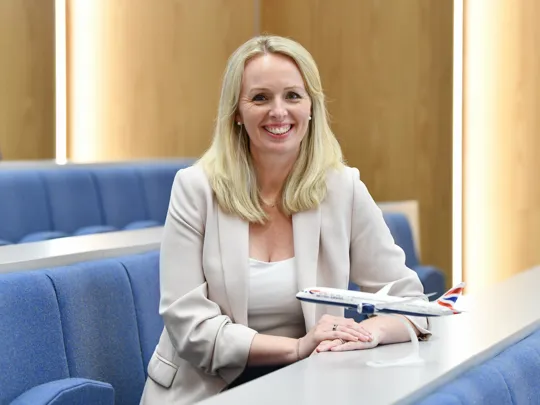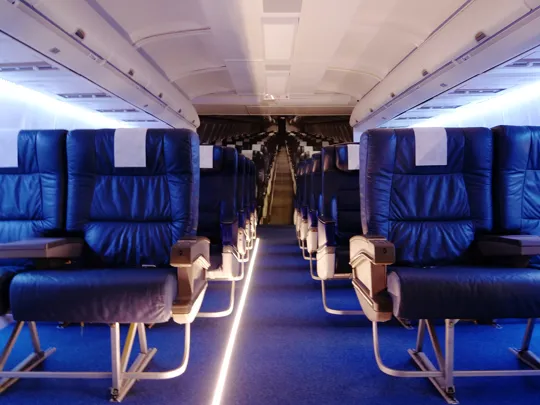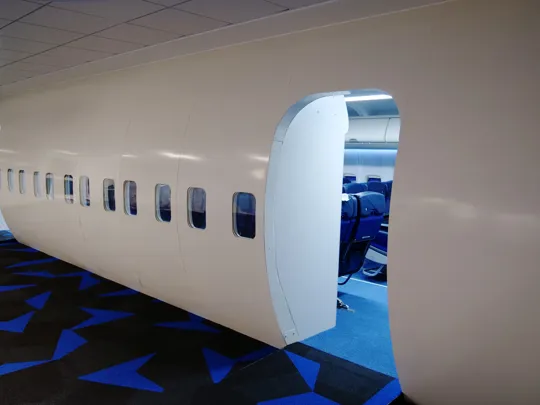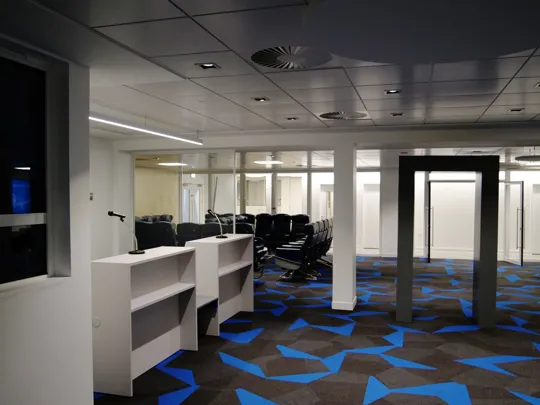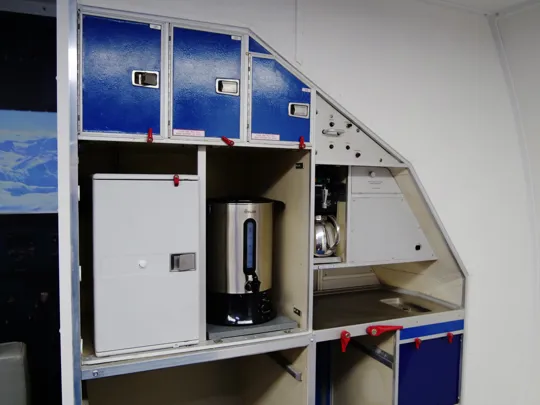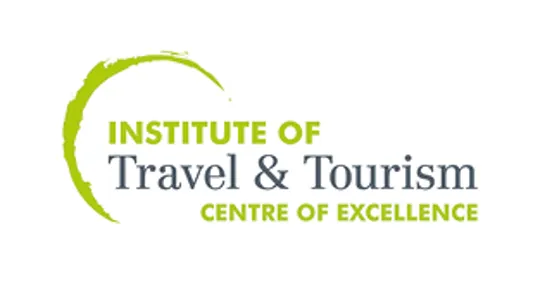of graduate employers say relevant experience is essential to getting a job with them
Why should I choose Aviation and Airport Management BA (Hons)?
- INTERNATIONAL RESIDENTIAL TRIPS – Take on aviation projects in the UK and overseas*, with essential trip costs covered by us – past destinations have ranged from Istanbul, Toulouse, Hamburg, Budapest, Edinburgh and Vienna (subject to visa requirements)
- INDUSTRY APPROVED – Study at an Institute of Travel and Tourism (ITT) Centre of Excellence, attending employability conferences and working on live industry projects with international aviation organisations.
- INDUSTRY- INFORMED TEACHING – Develop specialist knowledge and a versatile skill set with industry-informed teaching delivered by aviation specialists who have spent time working in industry, giving you a competitive advantage in the graduate job market
- WORK PLACEMENT (BA only) – Boost your career prospects and first-hand industry experience with a paid 48-week placement aligned with your subject area (subject to placement application)
- PERSONALISE AND SPECIALISE – Personalise your studies by selecting specialist optional modules from tourism, aviation, hospitality and events in your second and final year
Our facilities
Students on our aviation courses at University College Birmingham have access to outstanding simulation facilities in our new Aviation and Tourism Suite.
At University College Birmingham, you'll learn in modern spaces including lecture theatres, group work areas, and a well-resourced library with access to top industry data sources like Cirium, CAA, CAPA, Flight Global, UNWTO, WTTC, and more. Digital tools are embedded in lectures and practicals, with learning materials, quizzes, and discussions hosted on our Canvas platform.
Aviation and Tourism Suite
Take a look around our Aviation and Tourism Suite, featuring exciting simulation facilities for students on our aviation, travel and tourism courses.
Course breakdown
Students on the FdA have the option of progressing onto the final year upon completion of the foundation degree.
- Year 1
- Year 2
- Year 2/3
- Year 3/4
Core Modules
Global Aviation Environment
In Global Aviation Environment you will uncover the key players, sectors, and dynamic events that shape the global aviation industry. Learn how external factors like geopolitics, economic shifts, and emerging markets impact travel, while gaining insight into the legal and regulatory frameworks governing passenger movements. Discover the social, cultural, and economic significance of aviation, and explore how digital innovations and sustainability initiatives are transforming the industry. By the end of the module, you will have the knowledge and skills to navigate the complexities of global aviation and its future opportunities.
Aviation Passenger Experience
Aviation Passenger Experience introduces you to the fundamentals of consumer behaviour in the aviation industry, exploring how psychological, social, and cultural factors influence passenger decisions and experiences throughout their journey. By understanding passenger behaviour, you will learn how airlines and other aviation stakeholders design services to enhance satisfaction and loyalty. This module emphasises customer service innovation and the analysis and improvement of aviation systems to improve the passenger experience. With a strong focus on digital technologies, you will learn how to leverage these tools to transform the passenger experience. This module is perfect for students aiming to innovate and excel in the aviation sector by combining technical knowledge with creative thinking.
Personal Branding
You will be introduced to the concept of future employability readiness with the module Personal Branding. You will develop the knowledge and skills needed to develop your personal brand as a professional or entrepreneur of the future. This will include building an external profile and being introduced to a range of experiences related to the programme of study that you undertake, all designed to prepare you for successful placement and work experience opportunities.
Digital Content Creation
With Digital Content Creation, you will explore principles and tools for the effective curation of digital content that resonates with the modern consumer. You will learn how to develop compelling narratives, multimedia content, and use digital marketing tactics to engage diverse audiences. With a focus on practical application, this module will develop the essential skills needed to design innovative content campaigns that reflect evolving industry trends and sustainability goals.
Successful Airport Design
This module provides a comprehensive overview of the principles behind the design and planning of airport infrastructure. You will delve into topics such as master planning, airfield layout, terminal design, and the key differences between airside and landside functions. We will cover passenger services, logistics, cargo management, safety compliance, and ground handling, offering real-world insights into how airports are run. The module will also focus on developing essential skills like problem-solving, decision-making, project management, and customer service. Through a mix of lectures, seminars, and guest speakers from the industry, you will gain both theoretical knowledge and practical experience in airport planning and successful airport design.
Aviation Flight Planning
Aviation Flight Planning will develop your knowledge and skills in planning and managing flight routes effectively, focusing on the interplay of geographic, operational, regulatory, and technological factors. Through an exploration of day-to-day operations and strategies for handling disruptions, you will develop an understanding of the complexities of aviation route planning and the importance of maintaining business continuity during disruptive times.
Core Modules
Aviation Operations and Safety Management
This module is your passport to mastering the art of operations and safety management in one of the most dynamic industries on the planet. You will uncover how safety isn’t just a rule—it’s the heartbeat of aviation. From international safety standards to handling crises with cool-headed decision-making, this module dives into everything that keeps planes in the air and passengers secure. You will explore the human side of safety, tackling psychological and physical factors, while also delving into cutting-edge topics like cybersecurity threats and post-crisis recovery planning.
Aviation Revenue Management
This module explores the complexities of aviation business operations, covering key topics such as business models, cost structures, and sustainability. You will gain insights into revenue management techniques, competitive analysis, and strategic planning. Through interactive lectures and seminars, the module emphasises real-world applications and challenges in the industry, equipping you with the analytical and practical skills required for success in aviation management. Whether you’re aspiring to lead airline operations or understand the intricacies of aviation economics, this module offers a comprehensive foundation for navigating the competitive airline market.
Marketing Consultancy Project
This practical module is designed to provide you with real-world experience through work as a marketing consultant with a live Industry client from the aviation, tourism or hospitality industry. The context of the project will be to develop and implement a targeted marketing campaign focusing on showcasing a new product, service or customer experience, following the brief from the client. This project will enhance your employability and can be added to your CV as a live consultancy project, enhancing your ability to apply for jobs.
Business Innovation
In this module you will be introduced to the principles and practices of research within the context of a business in the hospitality, tourism or aviation industry, providing you with the necessary skills to design and conduct research that solves business problems and enhances opportunities. You will explore key stages of the research process, from defining SMART aims and objectives, completing background research into key theories and thinking, and explaining research processes, to analysing findings and developing actionable recommendations. With a strong focus on innovation, you will be encouraged to apply practical research principles to support decision-making and drive business success and innovation.
Sustainable Aviation Management
This module is your chance to explore one of aviation’s biggest challenges—making it more sustainable. You will explore how the environment, economy, society, and culture are affected by the aviation industry while learning about cutting-edge technologies and policies shaping the future. From examining the impact of airport expansions on local communities to uncovering the truth about “greenwashing” in aviation, you will take a close look at the industry’s journey toward eco-friendly skies. Through real-world case studies and exciting innovations, you will gain the tools to make a real difference. Whether you’re passionate about protecting the planet, intrigued by aviation tech, or driven to influence global transportation policies, this module sets you up for a career leading the way in sustainable aviation.
Plus one option from:
Aviation Security Operations
Aviation Security Operations provides an in-depth exploration of aviation security threats and the strategies to address them. You will gain a comprehensive understanding of the various types of threats facing the industry, including terrorism, cyber-attacks, and insider threats. Through case studies and practical exercises, you will learn to assess risks, develop security protocols, and implement effective solutions to safeguard passengers, crew, and aircraft. Emphasis will be placed on regulatory frameworks, technological advancements, and crisis management techniques to ensure a holistic approach to aviation security.
Cargo and Logistics Management
Step into the world of global commerce with Cargo and Logistics Management. The module is designed to provide you with the knowledge and skills needed to excel in the dynamic field of cargo and logistics. From understanding the impact of globalisation on supply chains to mastering the intricacies of intermodal transportation, this module will develop your skills in planning supply chain logistics, embedding sustainability and using digital technologies.
Gastronomy and Food Innovation
Global Gastronomy and Food Innovation will provide you with a comprehensive understanding of gastronomy, food cultures, and sustainable food management, giving you the knowledge, skills, and attributes required for a career in the evolving food and hospitality industries. You will gain insight into the cultural significance of food, the role of gastronomy in tourism, and the impact of global challenges such as food security and climate change. You will develop practical skills in sensory food evaluation, food sustainability strategies, and innovative culinary tourism experiences, while exploring cutting-edge trends like alternative proteins, AI in gastronomy, and experiential dining.
Digital Communication for Business
In a digital world, effective communication is a cornerstone of success in the tourism, aviation and hospitality industries. Digital Communication for Business will help you to develop the essential skills to thrive in the tourism, aviation, and hospitality industries. You will harness technology to enhance operations, strengthen customer engagement, and drive business growth through hands-on experience with industry-standard tools, AI, and data communication. The module explores ethical and cultural considerations in a globally connected digital world while providing practical learning through case studies, workshops, and industry insights. By solving real-world challenges and developing AI-driven strategies, you will gain the confidence to navigate digital platforms and lead effective, ethical communication in the modern workplace.
Niche Tourism
This module delves into the growing importance of niche tourism markets, from adventure and wellness to cultural and religious tourism. You will examine the drivers shaping these unique sectors, explore the challenges they face, and evaluate strategies for sustainable growth. Through engaging case studies and practical research, you will gain the skills to critically assess niche tourism businesses and propose innovative, evidence-based solutions that meet the needs of modern travellers. This module is perfect for those eager to shape the future of niche tourism.
Event Tourism and the Visitor Economy
In this module you will explore the role of medium to large-scale events in shaping a destination's visitor economy, examining how destinations bid for and host major events and considering operational planning, legacy, and stakeholder engagement. You will gain insights into the economic, social, and political impacts of events, along with the challenges and opportunities they present. The module covers key topics such as destination competition, infrastructure development, visitor management, sustainability, and inclusivity in event planning. Through real-world case studies and strategic analysis, you will develop the skills needed to evaluate event impact, create sustainable growth strategies, and ensure long-term benefits for host destinations.
Work Placement
Work Placement (optional) for BA Hons students only
You will gain valuable work experience on a 48-week work placement for BA students. This is an exciting opportunity to put what you have learned into practice, broaden your experience and demonstrate your abilities to potential employers.
Core Modules
Strategic Aviation Business Management
You will explore strategic planning within the context of the dynamic macro environment in which aviation providers operate. Central to the module delivery is the exploration of the drivers, dynamics and disruptors of global aviation industry, in an increasingly uncertain and turbulent environment. An emphasis is placed on the sustainable competitiveness of the aviation industry and the drive for innovative, creative and smart strategies. This module will utilise an array of case studies and data sets to explore both the present and future of the aviation industry.
Aviation Network Management
Prepare for a dynamic career in air traffic control with our Aviation Network Planning module. This module is designed to provide you with the essential knowledge and skills needed to excel in aviation network planning, traffic management, and strategic decision-making in complex airspace environments. Gain a comprehensive understanding of how to design and manage efficient aviation networks to ensure the smooth flow of air traffic. Learn the principles and practices of effective air traffic management, including the coordination and control of aircraft movements. Develop the ability to make strategic decisions in real-time, addressing challenges and optimising operations in complex airspace settings.
Strategic People Leadership
Strategic People Leadership will empower you with the essential leadership skills to thrive in today’s dynamic workplace. You will explore contemporary leadership theories, people management principles, and the key traits of successful leaders, including strategic thinking, emotional intelligence, and adaptability. You will learn how to manage and motivate high-performance teams within the tourism, hospitality or aviation industries, develop a positive workplace culture, driving innovation through equality, diversity and inclusion. Gain practical insights into change management, ethical leadership, and corporate social responsibility while developing the confidence to lead with integrity, resilience, and vision.
Enterprise and Innovation Showcase
This module provides you with the opportunity to demonstrate your capabilities in researching, planning and delivering an industry or community-related project relevant to events, aviation, hospitality or tourism businesses and organisations. You will research a new business product, service or system and develop it into an idea that you can deliver in a professional report and presentation. This project is designed to develop the graduate attributes of professionalism, critical enquiry and problem solving, enterprise, creativity, and innovation to support you in your career as a manager or entrepreneur of the future.
Plus two options from:
Crisis and Risk Management
Explore the challenges facing the tourism, aviation and hospitality industries, from natural disasters to reputational crises, and learn how to assess risks, develop strategic response plans, and manage stakeholders effectively. Master crisis communication across media channels, craft compelling digital PR campaigns, and safeguard brand reputation during times of uncertainty. With a focus on recovery strategies and futureproofing, this module will help you develop the skills necessary to build resilience and drive sustainable growth in an ever-changing global landscape. The module’s crisis simulation-based assessment will develop your critical thinking, decision-making, and communication abilities—preparing you for leadership roles in airlines, airports, tourism organisations, hospitality providers and government agencies.
Aviation Crash Investigations
Aviation Crash Investigations will support you in exploring the critical role of human factors in aviation safety and crash investigations. You will examine human information processing, decision-making, and cognitive limitations that impact flight operations. Key topics include human error classification, situational awareness, workload management, and the influence of stress and fatigue on pilot performance. The module also covers major human factor theories, flight deck design, and aeronautical decision-making. By the end of the module, you will develop a comprehensive understanding of how human, environmental, and systemic factors contribute to aviation incidents, and the strategies used to prevent them.
Aircraft Maintenance Systems Management
This module provides an in-depth exploration of aircraft maintenance systems. It develops your expertise in aviation maintenance, aircraft life cycle management, and MRO operations within regulatory frameworks. It integrates technical, regulatory, and strategic skills to optimise efficiency, address industry trends, and promote sustainability. Emphasising problem-solving and innovation, it prepares learners for careers in aviation maintenance management and MRO enterprises, and compliance oversight.
Strategic International Marketing
In Strategic International Marketing you will develop the skills and knowledge to navigate the complexities of global markets. As businesses expand into diverse and unfamiliar environments, this module focuses on identifying and overcoming obstacles to international market entry. You will explore practical marketing strategies, cultural considerations, and ethical implications, developing adaptable approaches for global success. Through real-world case studies and scenario analysis, you’ll gain insights into international business dynamics and decision-making processes, preparing you to capitalise on opportunities in emerging markets.
International Tourism Destination Management
Step into the role of a consultant tasked with future-proofing the long-term sustainability of a global destination management organisation. You will audit its current performance and develop strategic, inclusive visitor management and marketing plans. You will develop essential skills in governance, stakeholder collaboration, and sustainable tourism development, integrating best practices from UNWTO and UNESCO. You explore destination branding, digital marketing, and visitor experience management while tackling challenges like overtourism and climate targets. With a focus on creativity and strategic thinking, you will align your recommendations with societal goals such as community regeneration, SDGs, and a carbon-neutral future—preparing you for leadership roles in the evolving tourism industry.
Optimising Operational Efficiency
Optimising Operational Efficiency will provide you with the skills to analyse and enhance operational processes within a business to maximise efficiency and performance. You will explore the principles of process optimisation, examining how activities consume time and resources and how a strategic process redesign can improve overall business effectiveness. Through practical applications, you will develop the ability to identify inefficiencies, streamline operations, and implement solutions that drive productivity and resource efficiency.
The modules listed above for this course are regularly reviewed to ensure they are up to date and informed by industry as well as the latest teaching methods. On occasion, we may need to make unexpected changes to modules. If this occurs, we will contact all offer holders as soon as possible.
Disclaimer for Selecting Option Modules Outside of Degree Programme
Students who choose to study an optional module outside the core structure of their specific degree programme do so at their own discretion and are fully responsible for developing the subject knowledge and skills necessary to complete and pass the module successfully.
It is the student's responsibility to make an informed decision before selecting such modules. Students are strongly advised to thoroughly review the relevant Option Module Handbook and any supporting materials, including recorded briefings, to understand the academic expectations, content, and assessment methods.
By enrolling in a module outside their degree programme, students acknowledge and accept that they may need to undertake additional independent learning to meet the required academic standards.
Entry requirements
Aviation and Airport Management BA (Hons)
A-levels: An A-level grade profile of CDD.
T-levels: A T-level graded Pass with a core component of grade C.
BTEC: A BTEC grade profile of MMP. This can be achieved from either an Extended Diploma or a combination of smaller BTEC qualifications.
Tariff: Other Level 3 qualifications are accepted at University College Birmingham for entry. A minimum of 80 UCAS Tariff points will be required.
Access to Higher Education Diploma: 80 UCAS Tariff points including a minimum of 15 Level 3 credits at Distinction.
Aviation and Airport Management FdA
A-levels: An A-level grade profile of DD.
T-levels: A T-level graded Pass with a core component profile less than C.
BTEC: A BTEC grade profile of PP. This can be achieved from either an Extended Diploma or a combination of smaller BTEC qualifications.
Apprenticeship: Achieve an advanced apprenticeship (Level 3).
Tariff: Other Level 3 qualifications are accepted at University College Birmingham for entry. A minimum of 32 UCAS Tariff points will be required.
Access to Higher Education Diploma: 32 UCAS Tariff points.
Non-tariff: Non-UCAS Tariff-based Level 3 qualifications are also considered for entry. Please complete our enquiry form here to check your eligibility.
Work-based: We also give equal consideration to applicants who are currently in work and wish to apply to University College Birmingham. To apply, you must have a minimum of 3 years’ relevant work experience, demonstrating management or supervisory duties. Your application must also include a reference from your line manager supporting your entry to higher education. For further details, please contact Admissions.
International students
For academic and English entry requirements for EU and international students, please visit the Country Specific Information page.
Please note: As an International Student, when choosing optional placement, a visa extension may be required.
Key information
Teaching and assessment
Teaching takes place through weekly lectures and seminars across two 12-week semesters. Each semester, you will study three 20-credit modules, supported by our weekly Skills for Success module and personal tutorials to enhance your academic and career development.
Assessment is industry-informed and is designed to reflect the wide range of roles and skills in the aviation sector. Our assessment aims to prepare you for employment by developing specialist knowledge and practical skills needed by industry, giving you a competitive advantage in the graduate job market.
You will be assessed through a variety of methods, such as-
• Industry live projects
• Online simulations
• Digital presentations
• Digital content creation
• Student debates and discussions
• Business pitches
• Academic posters and infographics
• Industry standard toolkits
Every assessment is designed to bring you closer to the career you want, helping you graduate not just with knowledge, but with the skills, experience and edge to make a real impact.
Throughout your journey, you will be supported by personal tutors and module leaders who tailor their guidance to your individual needs, ensuring you always feel confident, capable and ready to succeed.
Our teaching and assessment is underpinned by our Learning and Teaching Strategy 2025-2030.
Timetable
We understand that you need to balance study with work, so wherever possible your lessons will be timetabled into 2-3 days a week.
Tuition fees for home students
If you are a home student enrolling on a bachelor's or foundation degree course at University College Birmingham, the 2025/2026 academic year tuition fee for full-time study is £9,535. For part-time study, the fee is £4,767.50.
Tuition fees for international students
If you are an international student (or have been fee assessed as an international fee payer) and are enrolling on a full-time [Band 1] bachelor's degree course in 2025/2026, the fee for the academic year will be £16,000. If you complete a placement year, there will be an administration fee of £500 for a full year or £250 for a half-year placement.
Kick-Start Scheme
As a new student studying this course full-time, you will receive £300 per year through our Kick-Start Scheme (UK students only, eligibility criteria applies). This scheme will support your studies and future career by contributing to course-related materials, uniform or selected items on campus. You may also qualify for an additional £500 per year.
Find out more about the Kick-Start Scheme here.
Unibuddy Community - meet other students on your course
Starting university is an exciting time, but we understand that it can sometimes feel a little daunting. To support you, you will be invited to join our Unibuddy Community, where you can meet other students who have applied for the same course at University College Birmingham, before you start studying here.
As soon as you have been made an offer, you will be sent an invitation email to complete your registration and join the Unibuddy Community. For more information, check out our Unibuddy Community page.
Latest updates
Join the conversation and check out the latest updates from our Department of Hospitality and Tourism.
| UCB Hospitality | |
| UCB Tourism |
Accreditations, endorsements and partnerships
University College Birmingham works with a wide range of organisations to ensure you receive the best possible training and qualifications recognised by industry.
Work placements
Work placements are vital for gaining real-life experience and for building your confidence and skills before you finish your course – and they may even lead to a job when you graduate. Our HIRED team can help find the ideal placement for you.
Our four-year BA Aviation and Airport Management course features a 48-week paid placement, during which you will not incur any tuition fees. (There is also the option to study the course without a placement.) Opportunities are also available for part-time work during the summer months.
Work alongside experts in your sector
A snapshot of some of the employers we have worked with:
- TUI
- Airbus
- Lufthansa
- Ryanair
- Collins Aerospace
- GE Engines
- NATS
- British Airways
Please note: All formal placements depend on availability and are subject to an application/interview process. Security clearances and airside access are outside the control of the University. For more information, please visit the Civil Aviation Authority website.

Designed in conjunction with industry, shaped by student feedback and with employability at the heart of everything we do, our Aviation and Airport Management programme will transform your prospects, accelerate your career path and secure your future in the aviation industry.
Our aim is to deliver contemporary, cutting-edge teaching and learning based on an employability-informed curriculum that is tailored to your individual needs, guiding you into graduate level positions.
Career opportunities
The example roles and salaries below are intended as a guide only.
Airport operations manager
Average Salary: £35,461
Aviation safety officer
Average salary: £30,000 - £38,000
Ground operations supervisor
Average salary: £30,000 - £35,000
Airline management graduate trainee
Average salary: £28,000 - £35,000
Air traffic management assistant
Average salary: £28,000 - £35,000
Airport security manager (graduate entry)
Average salary: £27,000 - £34,000
Want to take your studies to the next level? Completing the BA (Hons) degree will enable you to move onto our postgraduate courses such as Aviation Management MSc/PGDip or International Tourism Management MSc/PGDip.

Roland’s Story
From classroom to cockpit, UCB graduate Roland Ozolins now coordinates private jet flights for the stars at LunaJets.
How students on this course rate us for...
Assessment and feedback
93.6%
Learning resources
93.3%
Teaching on my course
91%
*National Student Survey (NSS) 2025 - BA/BSc (Hons) figures
Meet your lecturers





